All English posts
EU 2014 – 20 budget “will enable us to finish the physical modernization of Poland, the building of our roads, rail and scientific infrastructure, and a chance for us to catch up with the rest of Europe.”
“We would like to have Western-style neighbours on both sides of the border – which is easier said than done.” (Ukraine, Lithuania)
Audio – Polish Radio
Die Stalingrad-Protokolle was compiled by German historian Jochen Hellbeck, professor at Rutgers University in New Jersey, who gained access to the archives at the Soviet Academy of Sciences in Moscow, where he found several thousand interviews with Second World War Red Army soldiers. 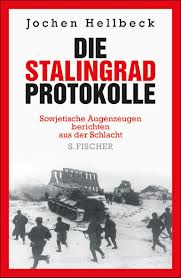
Mr. Professor, could you briefly tell us the story of the “Stalingrad Protocols” and why they remained in the archives for so many years?
The Stalingrad Protocols emerged as the result of the work of the Moscow’s Commission of historians. A small delegation was sent to Stalingrad in December 1942 before the battle was over. They collected hundreds of interviews to the Defenders of Stalingrad. They talked to commanders, famous people, but also simple soldiers and civilians. All together they created a huge documentary imprint that was then hidden, because it is about the people’s war. That was good for the regime during the conflict when the regime needed the people backing. But after the war Stalin claimed the victory just for himself. These documents were dangerous for him and they disappeared.
* * * Author: Giuseppe D’Amato
Jochen3inglese – Interview
Bulgaria, the nuclear row.
30 Jan 2013 Former Energy Minister Traycho Traykov has defined the January 27 referendum on the development of nuclear energy in Bulgaria as a “damaged item in democratic packaging.”
“The question was actually do you agree to buy it and throw it out or buy it and then eat it,” Traykov stated in an interview for Nova TV.
He said that it was highly doubtful whether the referendum had brought profits for anybody. 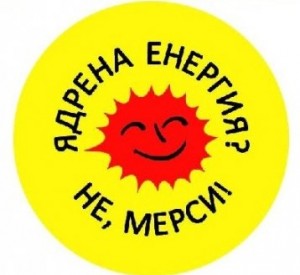
Bulgaria’s former Energy Minister suggested that there were several ways to interpret the results of the referendum.
“Of those who voted “no”, some voted against the Belene NPP, others against nuclear energy in general, still others against Belene NPP but for a seventh unit at the Kozloduy NPP, others against Belene NPP and against 7th unit, but for an extension of the lives of units 5 and 6, so there is a huge risk that you voted for one thing, while your answer is interpreted another way,” he explained.
He claimed that the referendum would still have resulted in nothing even if the question had been stated clearly.
“People told politicians that they are mature enough to understand when they are being sold a fake item,” Traykov pointed out.
Bulgaria’s former Energy Minister said that he had abstained from voting at the referendum.
According to preliminary results of the January 27 referendum on the development of nuclear energy in Bulgaria, a total of 60.55% voted in favor of the construction of a new nuclear power plant in the country.
With 97.14% of the votes counted, it emerged that a total of 832 742 people had backed the potential construction of a new nuclear power plant, while 522 927 had voted against.
The referendum was invalidated by low turnout, as merely 21% of the eligible voters cast ballots.
As the turnout is over 20%, and more than half of the votes are positive, the question is to be returned to Parliament for further discussion.
The government says it supports the provision of nuclear power from an existing plant at Kozloduy, but that it does not have the 10bn euros (£6.3bn; $13.4bn) it says would be needed to build a new plant.
Bulgaria had to close four of its old reactors at Kozloduy as a precondition for its 2007 EU membership.
The government froze plans to finish the plant at Belene last year, when work at the site on the southern bank of the River Danube was already well under way.
The Socialists are seen as closely linked to the Belene project, having granted a construction contract for the plant to Russian state company Atomstroyexport in 2008. They say Belene would now cost 4-6bn euros to complete, and would lower electricity costs for consumers.
Source: Sofia News Agency, BBC.
Early elections should be held as soon as possible in the Czech Republic, president-elect Miloš Zeman told Czech Television. Zeman said the center-right government is reliant on LIDEM, an offshoot of the Public Affairs (VV) Party which was never elected. PM Petr Nečas responded that the government is responsible to Parliament, not the president, and will continue as long as it holds a majority in the lower house. Zeman, a leftist candidate, won the Czech presidential elections with 54.8 percent Jan. 26, receiving half a million votes more than his conservative rival Karel Schwarzenberg. The voter turnout was 59.11 percent. 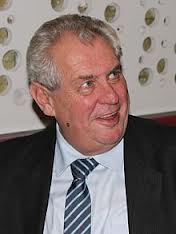
Czech subsidy recipients drawing from European Union funds have so far received 407.9 billion Kč for the program period 2007-2013, which is equal to 52 percent of the total amount the Czech Republic can draw in this timeframe, the Local Development Ministry announced today. In the last quarter of 2012, successful subsidy recipients received 38.5 billion Kč worth of European subsidies. Of the total amount of subsidies paid out to recipients by the Czech Republic, the Czech Finance Ministry has asked the European Commission (EC) for the payment of 233.9 billion Kč, or 29.8 percent of the total allocated amount.
The German government should not invite Zeman to Berlin due to his anti-German campaign, daily Die Welt claimed in an editorial. Zeman’s comments regarding the 1945 deportation of some 2 million Sudeten Germans from Czechoslovakia points to a language of hate that should not be tolerated in European politics, the daily wrote. Another German newspaper, Südwest Presse, referred to the president-elect as a “leftist dinosaur” who sowed fear in the minds of “little people” to get himself elected. “The Sudeten German topic is unlikely to have any political relevance for Zeman’s political practice. It just served him as a way to get to the Prague Castle,” the daily wrote.
Article, The Prague Post, Jan 28th, 2013.
In electoral campaign
Miloš Zeman
Age: 68
Party: SPOZ
Presidential amnesties: Would never declare one, even at the end of his presidency
Same-sex adoption: Would recommend it if the child’s life improved as a result
Church restitution: Thinks people should decide on the issue in a referendum
Nuclear energy: Favors atomic power and is for expanding Temelín
Right to veto: Would use this right if he felt the piece of legislation was bad
Communists in government: Would appoint them to respect the voters’ will
– –
“The enemy is the anti-civilization spreading from North Africa to Indonesia,” Zeman told a conference on European values. “Two billion people live in it, and it is financed partly from oil sales and partly from drug sales.” He went on to liken Muslims who believe in the Koran to Nazi supremacists.
While Zeman and Schwarzenberg have the same goal for Europe, their views on the rest of the world differ significantly. The former premier would focus more on growing links with Moscow (SPOZ is accused of having nefarious connections to several Russian businesses), while the latter would align himself more with the United States, having shown concern over the resurgent influence of President Vladimir Putin’s Russia.
Jonathan Crane – Article – The Prague Post
“Cardinal Jozef Glemp was a primate of great breakthroughs, and he showed great composure and wisdom in the face of extreme political divisions,” declared Cardinal Stanislaw Dziwisz, Archbishop of Krakow, during Monday’s funeral service, as cited by the Polish Press Agency (PAP).
“During the difficult times of communism, he stood boldly and prudently on the side of the nation, striving for freedom and complete independence from the totalitarian system,” the cardinal reflected. 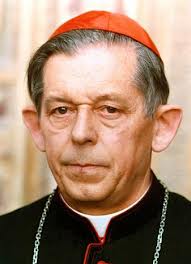
Current Primate of Poland Archbishop Jozef Kowalczyk said in his homily that Glemp had been faithful to the teaching of Pope John Paul II, encouraging people “to change the world through words and dialogue, and not by the sword and firearms.”
Main Article – Radio Polska, Jan.28th, 2013.
– –
“Jozef Glemp was born Dec. 18, 1929, in Inowroclaw, Poland. He decided early to be a priest, but his schooling was interrupted when the Nazis invaded in 1939. His father, a salt miner, joined the resistance, but Jozef, his mother, sister and two brothers became slave farm labourers. Ordained in 1956, Glemp was a parish priest and teacher before earning doctorates in civil and canon law in Rome. He returned to Poland in 1964 and was Wyszynski’s legal adviser for 12 years. He was Bishop of Warmia, a diocese of 1.3 million, from 1979 to 1981, when he succeeded Wyszynski on his death.
As he settled into his role as protector of the church in a national crisis, he asked Poles to pray instead of taking to the streets when martial law was imposed and Walesa was jailed…”
Main Article – The Globe and Mail Jan. 27th, 2013.
Ukraine has said it wants to strengthen human rights during its term – while facing criticism for its own democratic credentials.
Opposition leader Tymoshenko was sentenced to seven years imprisonment in a trial that drew wide international criticism. As a result, she was unable to take part in parliamentary elections in late October, which the OSCE observer mission declared to be unfair and a “step backwards.” 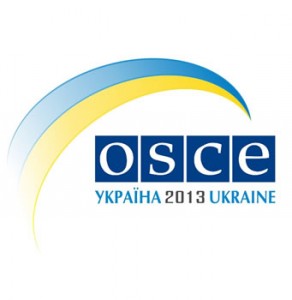
Susan Stewart at the Berlin-based German Institute for International and Security Affairs (SWP) also believes that Ukraine’s reputation has suffered in recent years because of human rights violations and backpedalling on democracy. “That’s why I think it will be difficult for Ukraine to exercise strong leadership,” Stewart said.
Ukraine is the second former Soviet republic to assume the OSCE presidency after Kazakhstan in 2010, which paved the way. But Kazakhstan was also criticized for human rights violations.
The OSCE was created during the Cold War to serve as a forum for dialogue between the warring blocs in the East and West. Today, the Vienna-based organization unites 57 nations from Europe, Central Asia and North America. It fights terrorism, seeks to resolve conflicts and helps protect the environment. Observing human rights and fundamental freedoms is a key part of OSCE’s security concept.
Old divisions threaten to paralyze its work.
Complete Article – Roman Goncharenko – Deutsche Welle
OSCE-Ukraine
Ukraine’s representative at the negotiations on the Transdniestrian conflict settlement, Ihor Kharchenko has said that the Transdniestrian conflict settlement will be the No. 1 priority during Ukraine’s presidency of the OSCE in 2013.
Ukraine, The Second Azarov’s Cabinet.
29 Dec 2012Serhiy Arbuzov, former head of the National Bank, was appointed First Vice Prime Minister.
Yuriy Boyko and Oleksander Vilkul were appointed Vice Prime Ministers.
Former foreign minister Kostiantyn Hryschenko appointed another Ukraine’s Vice Premier.
Olena Lukash became a Minister of Cabinet of Ministers. 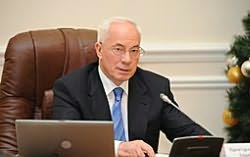
Yuri Kolobov remained at the position of Finance Minister.
Ihor Prasolov took a seat of Minister of Economic Development and Trade, which was previously occupied by Petro Poroshenko.
Eduard Stavytsky became Energy and Coal Industry Minister.
Instead of Borys Kolesnikov, the seat of Infrastructure Minister was occupied by Volodymyr Kozak, former Head of the State Railway Administration of Ukraine. While Kolesnikov became a governor of Dnipropetrovsk Oblast.
Hennady Temnyk was appointed Minister of Regional Development, Construction and Utilities.
Oleh Proskuriakov became Minister of Ecology and Natural Resources.
Natalia Korolevska was appointed Minister of Social Policy.
Oleksander Klymenko, former head of the State Tax Administration, was appointed Minister of Revenues and Duties. Yanukovych has reorganized the State Tax Service and the State Customs Service into the Ministry of Revenues and Duties of Ukraine.
Pavlo Lebedev became Defense Minister.
Vitaly Zakharchenko remained Interior Minister.
Leonid Kozhara was appointed a new Minister of Foreign Affairs.
Mykhaylo Bolotsky became Head of the reorganized State Emergency Service.
Oleksander Lavrynovych was again appointed Minister of Justice.
Dmytro Tabachnyk remained at the position of the Education Minister.
Raisa Bohatyriova was reappointed Health Minister.
Yanukovych has reappointed Mykola Prysiazhniuk as the agrarian policy and food minister.
This cabinet was appointed by President Viktor Yanukovych on 24 December 2012.
Source: Kyiv Post, Interfax Ukraine
Today we held our 30th EU-Russia Summit. This is a real tribute to the important nature of our partnership. It demonstrates the priority which we attach to this strategic relationship. Russia and the EU have a lot to gain from cooperating.
Our economies are strongly linked:
45 % of Russia’s exports go to the EU, while 35 % of Russia’s imports come from the EU.
We are neighbours on our continent. More than 5 million Schengen visas were issued in 2011 in Russia. We may have different positions in some areas but we have more common interests. We must work together to guarantee security and stability on the European continent, to tackle global challenges and governance issues, and to promote economic growth. 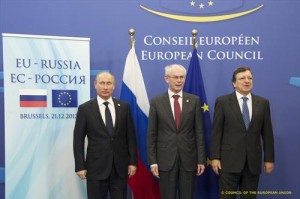
We have had a positive and constructive working summit. It provided us with an important occasion to take stock of main developments and to review progress and challenges across the wide range of EU-Russia relations. We also discussed how we can deepen our cooperation and implement already agreed commitments.
Our Partnership for Modernisation works. We have taken note of the latest Progress Report, and welcome the good results achieved in many areas. Further progress has to be made in the negotiations towards a New Agreement, which can put our future relations on a solid legal basis. The EU is very eager to progress faster in these negotiations.
We have discussed domestic economic developments in Russia and the EU. I explained the decisions of last week’s European Council regarding the strengthening of the EMU and the huge progress we made in stabilising the euro zone.
The EU is deeply convinced that we need to create space for civil society activities in order to achieve an effective modernisation of the economy and of the society.
We have noted the outcome of our latest Human Rights Consultations on 7 December which provided a useful occasion to discuss our concerns on the freedom for civil society activities and the exercise of fundamental rights in Russia. I mentioned also other concerns, including the case of Sergey Magnitsky.
As regards foreign policy, we have discussed ways to deepen our political cooperation at global level. We already work well together on issues like the Middle East Peace Process, Afghanistan or Iran. We have to continue our efforts to find a peaceful political solution on Syria in full support of Mr Brahimi’s efforts.
Russia and the EU work closely together in the Quartet, and we remain committed to a two-state solution to the Israeli-Palestinian conflict. In this respect I would like to highlight the joint statement by Foreign Minister Lavrov and High Representative Ashton today on the Middle East Peace Process.
As regards our Common Neighbourhood, I highlighted the need to achieve stability and security as well as democracy and a market-oriented economy. This is the aim of EU’s support within the Eastern Partnership Programme, especially as regards to Ukraine, Moldova and Georgia.
We welcome that the elections in Georgia open up new opportunities to improve bilateral relations and work towards stability in the Southern Caucasus, on the basis of the respect for territorial integrity.
It is particularly important to address the protracted conflicts. I also raised the importance of moving forward in the ‘5+2’ talks on the conflict in Transnistria and expressed concerns regarding developments in Nagorno-Karabakh.
By working together, the EU and Russia can make a decisive contribution to global governance and regional conflict resolution, to global economic governance in the G 8 and G 20, and to a broad range of international and regional issues. I would like to congratulate President Putin for taking over the presidency of G 20.
I am pleased that President Putin and the EU have discussed all these issues openly in a very constructive atmosphere. I want to thank the President of the Russian Federation for the constructive and productive exchange.
Press statement
by the President of the European Council
Herman Van Rompuy
following the 30th EU-Russia Summit.
Brussels, 21 December 2012
EUCO 243/12
PRESSE 557
PR PCE 206
The Ministry of Justice has received the independent report of the law firm Skadden, Arps, Slate, Meagher & Flom LLP, following its investigation of the Yulia Tymoshenko prosecution for exceeding her official powers at the conclusion of contracts between Russian Gazprom and Naftogaz Ukraine.
In accordance with the signed agreement, Skadden, Arps, Slate, Meagher & Flom LLP has delivered an independent report that clearly documents the events that were the subject of the trial and the trial itself. Through detailed analysis and a focus on the evidence, the report addresses critics, who have challenged the legal process and also the conviction, based on Yulia Tymoshenko’s claims that the prosecution was politically motivated and that her human rights have been abused. For this reason, the Ministry of Justice asked the leading international law firm to investigate the matter, taking into account all legal documents and opinions of all parties. 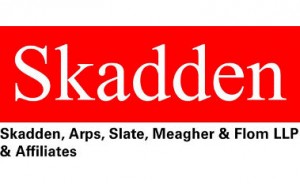
This report, published today on the Ministry’s website without amendment, concludes as groundless Yulia Tymoshenko’s claims that her prosecution was politically motivated and states that she has provided no factual evidence that would be sufficient to overturn her conviction under European or American standards.
The report also points out that Yulia Tymoshenko’s conduct in court would have been unacceptable in other countries and would likely have resulted in a contempt of court finding.
The Skadden, Arps, Slate, Meagher & Flom LLP report shows how Yulia Tymoshenko overstepped her authority and committed this crime:|
1. by drafting Directives that set forth the terms that she and Prime-minister of Russian Federation had agreed to;
2. by ordering the head of NAK Naftogaz Ukraine to sign an agreement with Gazprom in the absence of approval from the Cabinet of Ministers;
3. by threatening to fire the head of NAK Naftogaz Ukraine if he did not sign the agreement;
4. and by deceiving the head of NAK Naftogaz Ukraine into believing that the Cabinet of Ministers had approved the agreement after producing an official looking document bearing her signature and the seal of Ukraine’s Cabinet of Ministers, despite the fact no such approval had been given for the document named “Directives”.
Even where the Skadden, Arps, Slate, Meagher & Flom LLP Report questions certain procedural decisions by the court, it concludes that these decisions were based on actions by Tymoshenko designed to disrupt the court’s work.
The court concluded that Yulia Tymoshenko’s actions caused grave damage to Ukraine, since citizens of Ukraine continue to pay the highest prices in Europe for their gas due to Tymoshenko’s deal with Russia. In this sense, every citizen of this country is a victim of this crime.
The Ministry of Justice is grateful to Skadden, Arps, Slate, Meagher & Flom LLP for this professional analysis that unconditionally lays out the facts of this matter.
Contact: Press Office – Ministry of Justice
Telephone: +38 044 271 17 33
Email: press@minjust.gov.ua
Ukraine, the new Rada among fists and protests.
12 Dec 2012The Verkhovna Rada faction registered the Regions Party faction of 210 MPs. Yefremov was elected the head of the faction. The faction of the Batkivschyna United Opposition includes 99 MPs. The head of the faction is Arseniy Yatseniuk. The parliament also registered the UDAR Party faction of 42 deputies. The head of the faction is Vitali Klitschko. The Svoboda Party faction includes 37 MPs. The head of the faction is Oleh Tiahnybok. The faction of the Ukrainian Communist Party includes 33 MPs. It is headed by Petro Symonenko.
Five out of 450 Parliament seats remain empty after allegations of fraud and ballot-stuffing led election officials to schedule new votes in five dispute election districts. 
Lawmakers from Tymoshenko’s party showed up wearing black jerseys with her portrait on the front and the phrase “Freedom to Political Prisoners” written on the back. A fist fight began when opposition lawmakers shouting “No to defectors!” attacked two legislators, Oleksandr Tabalov and Andrei Tabalov (a father and a son), who had been elected on the opposition ticket but were suspected of preparing to defect to Yanukovych’s party. The three oppositional parties, which have a total of 178 out of the 445 filled seats at Verkhovna Rada, managed to block most of the pro-presidential Party of Regions initiatives.
Outside the building, members of the famous feminist group Femen took off their clothes to protest against the incompetence and corruption of the nation’s lawmakers.
Welcome
We are a group of long experienced European journalists and intellectuals interested in international politics and culture. We would like to exchange our opinion on new Europe and Russia.
Categories
- Breaking News (11)
- CIS (129)
- Climate (2)
- Energy&Economy (115)
- EU Eastern Dimension (85)
- Euro 2012 – Sochi 2014 – World Cup 2018, Sport (43)
- Euro-Integration (135)
- History Culture (198)
- International Policy (261)
- Military (74)
- Interviews (18)
- Italy – Italia – Suisse (47)
- Odd Enough (10)
- Poland and Baltic States (126)
- Religion (31)
- Russia (421)
- Survey (4)
- Turning points (4)
- Ukraine (176)
- Российские страницы (113)
Archives
- November 2020
- October 2020
- September 2020
- August 2020
- July 2020
- May 2020
- April 2020
- March 2020
- January 2020
- December 2019
- November 2019
- October 2019
- September 2019
- August 2019
- July 2019
- June 2019
- May 2019
- April 2019
- March 2019
- February 2019
- December 2018
- November 2018
- October 2018
- September 2018
- August 2018
- July 2018
- June 2018
- May 2018
- April 2018
- March 2018
- February 2018
- January 2018
- December 2017
- November 2017
- October 2017
- September 2017
- August 2017
- July 2017
- May 2017
- March 2017
- January 2017
- December 2016
- November 2016
- October 2016
- September 2016
- July 2016
- June 2016
- May 2016
- April 2016
- February 2016
- January 2016
- November 2015
- October 2015
- September 2015
- June 2015
- April 2015
- March 2015
- February 2015
- January 2015
- December 2014
- November 2014
- October 2014
- September 2014
- August 2014
- July 2014
- June 2014
- May 2014
- April 2014
- March 2014
- February 2014
- January 2014
- December 2013
- November 2013
- October 2013
- September 2013
- August 2013
- July 2013
- June 2013
- May 2013
- April 2013
- March 2013
- February 2013
- January 2013
- December 2012
- November 2012
- October 2012
- September 2012
- August 2012
- July 2012
- June 2012
- May 2012
- April 2012
- March 2012
- February 2012
- January 2012
- December 2011
- November 2011
- October 2011
- September 2011
- August 2011
- July 2011
- June 2011
- May 2011
- April 2011
- March 2011
- February 2011
- January 2011
- December 2010
- November 2010
- October 2010
- September 2010
- August 2010
- July 2010
- June 2010
- May 2010
- April 2010
- March 2010
- February 2010
- January 2010
- December 2009
- November 2009
- October 2009
- September 2009
- August 2009
Our books




